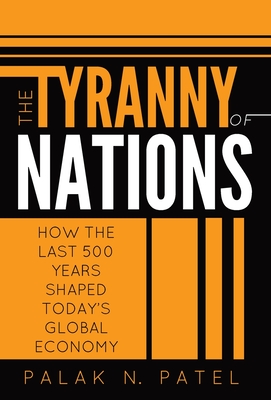The Tyranny of Nations: How the Last 500 Years Shaped Today's Global Economy

The Tyranny of Nations: How the Last 500 Years Shaped Today's Global Economy
The Tyranny of Nations places the ground-shaking political and economic events of modern times in context. Palak Patel draws on his experience investing in government bond markets to demonstrate how the present fits a specific historical pattern that has defined the past 500 years. Modern-day trade liberalization and financial expansion all share distinct parallels with similar events in the 1600s and 1800s. Likewise, China's economic trajectory matches that of 19th-century Prussia and 17th-century France. And a certain British Prime Minister, foreshadowing Donald Trump's populism 150 years later, launched a similar attack on globalization after the financial crisis of 1866. In The Tyranny of Nations, there are no "isms"-no capitalism, socialism, or feudalism-but instead, only privileged interests vying for power. Challenging both the mainstream and its critics, Palak Patel shows how an endless cycle of cooperation and conflict between nations drives societal change. This unique perspective on the intersection of macroeconomics, history, and politics offers the reader a compass for navigating the future.
The Tyranny of Nations places the ground-shaking political and economic events of modern times in context. Palak Patel draws on his experience investing in government bond markets to demonstrate how the present fits a specific historical pattern that has defined the past 500 years. Modern-day trade liberalization and financial expansion all share distinct parallels with similar events in the 1600s and 1800s. Likewise, China's economic trajectory matches that of 19th-century Prussia and 17th-century France. And a certain British Prime Minister, foreshadowing Donald Trump's populism 150 years later, launched a similar attack on globalization after the financial crisis of 1866. In The Tyranny of Nations, there are no "isms"-no capitalism, socialism, or feudalism-but instead, only privileged interests vying for power. Challenging both the mainstream and its critics, Palak Patel shows how an endless cycle of cooperation and conflict between nations drives societal change. This unique perspective on the intersection of macroeconomics, history, and politics offers the reader a compass for navigating the future.
The Tyranny of Nations places the ground-shaking political and economic events of modern times in context. Palak Patel draws on his experience investing in government bond markets to demonstrate how the present fits a specific historical pattern
PRP: 186.00 Lei
Acesta este Prețul Recomandat de Producător. Prețul de vânzare al produsului este afișat mai jos.
167.40Lei
167.40Lei
186.00 LeiIndisponibil
Descrierea produsului
The Tyranny of Nations places the ground-shaking political and economic events of modern times in context. Palak Patel draws on his experience investing in government bond markets to demonstrate how the present fits a specific historical pattern that has defined the past 500 years. Modern-day trade liberalization and financial expansion all share distinct parallels with similar events in the 1600s and 1800s. Likewise, China's economic trajectory matches that of 19th-century Prussia and 17th-century France. And a certain British Prime Minister, foreshadowing Donald Trump's populism 150 years later, launched a similar attack on globalization after the financial crisis of 1866. In The Tyranny of Nations, there are no "isms"-no capitalism, socialism, or feudalism-but instead, only privileged interests vying for power. Challenging both the mainstream and its critics, Palak Patel shows how an endless cycle of cooperation and conflict between nations drives societal change. This unique perspective on the intersection of macroeconomics, history, and politics offers the reader a compass for navigating the future.
The Tyranny of Nations places the ground-shaking political and economic events of modern times in context. Palak Patel draws on his experience investing in government bond markets to demonstrate how the present fits a specific historical pattern that has defined the past 500 years. Modern-day trade liberalization and financial expansion all share distinct parallels with similar events in the 1600s and 1800s. Likewise, China's economic trajectory matches that of 19th-century Prussia and 17th-century France. And a certain British Prime Minister, foreshadowing Donald Trump's populism 150 years later, launched a similar attack on globalization after the financial crisis of 1866. In The Tyranny of Nations, there are no "isms"-no capitalism, socialism, or feudalism-but instead, only privileged interests vying for power. Challenging both the mainstream and its critics, Palak Patel shows how an endless cycle of cooperation and conflict between nations drives societal change. This unique perspective on the intersection of macroeconomics, history, and politics offers the reader a compass for navigating the future.
The Tyranny of Nations places the ground-shaking political and economic events of modern times in context. Palak Patel draws on his experience investing in government bond markets to demonstrate how the present fits a specific historical pattern
Detaliile produsului













